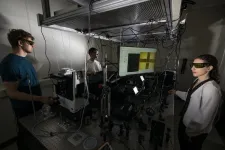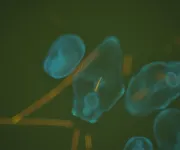(Press-News.org) MINNEAPOLIS – For people with relapsing-remitting multiple sclerosis (MS), a new study has found that the drug ofatumumab is more effective than teriflunomide at helping people across racial and ethnic groups reach a period of no disease activity. The study is published in the July 17, 2024, online issue of Neurology®, the medical journal of the American Academy of Neurology. Ofatumumab, a monoclonal antibody, is a newer drug for treating MS. Teriflunomide, an immunomodulatory agent, has been available for over a decade.
MS is a disease in which the body’s immune system attacks myelin, the fatty white substance that insulates and protects the nerves. Symptoms may include fatigue, numbness, tingling or difficulty walking. Relapsing-remitting MS is the most common stage of the disease, marked by symptom flare-ups followed by periods of remission.
“Ethnically diverse groups, including Black and African American, Hispanic and Latino, and Asian individuals, are consistently underrepresented in clinical trials, limiting the data available to help make the best treatment decisions for people in these groups,” said study author Mitzi Joi Williams, MD, of Joi Life Wellness MS Center in Atlanta and a Fellow of the American Academy of Neurology. “Our study examined the efficacy and safety of ofatumumab in diverse populations. We found overall the drug was effective and safe across racial and ethnic groups.”
The study was a post hoc analysis of two previous studies, meaning the researchers looked back at data already collected to more closely examine racial and ethnic differences.
The study involved 1,882 participants, of which 3% self-identified as non-Hispanic Black, 4% as non-Hispanic Asian, 8% as Hispanic/Latino and 82% as non-Hispanic white. The remaining participants were classified as “other/unknown.”
One half of participants received 20 milligrams (mg) ofatumumab every four weeks. The other half received 14 mg of teriflunomide once daily. Participants were followed for two years.
Researchers examined disease activity. No disease activity meant participants had no new relapses with symptom flare-ups, no change in disability and no new lesions in the brain or spine detected with an MRI scan.
Over the study, 33% of non-Hispanic Black participants taking ofatumumab had no disease activity compared to 3% taking teriflunomide. Among non-Hispanic Asian participants, the percentages were 43% and 22% respectively. For Hispanic/Latino participants, 37% and 19%, and for non-Hispanic white participants, 37% and 17%. The proportion of people treated with ofatumumab who had no disease activity was consistent among all race and ethnicity groups.
Rates of experiencing side effects were similar for all groups.
“Determining whether there are differences in how people respond to MS therapies is of great importance so that ultimately, each person is given the most effective treatment for them,” said Williams. “Underrepresentation of diverse populations continues to be an issue in research. Future studies should strive to enroll racially and ethnically diverse groups to better inform treatment decisions.”
The study was supported by Novartis Pharmaceuticals Corporation, the maker of ofatumumab.
A limitation was that the original studies examined in this analysis were not designed to examine the efficacy and safety of the drugs based on race and ethnicity.
Learn more about multiple sclerosis at BrainandLife.org, home of the American Academy of Neurology’s free patient and caregiver magazine focused on the intersection of neurologic disease and brain health. Follow Brain & Life® on Facebook, X and Instagram.
When posting to social media channels about this research, we encourage you to use the hashtags #Neurology and #AANscience.
The American Academy of Neurology is the world's largest association of neurologists and neuroscience professionals, with over 40,000 members. The AAN’s mission is to enhance member career fulfillment and promote brain health for all. A neurologist is a doctor with specialized training in diagnosing, treating and managing disorders of the brain and nervous system such as Alzheimer's disease, stroke, concussion, epilepsy, Parkinson's disease, multiple sclerosis, headache and migraine.
For more information about the American Academy of Neurology, visit AAN.com or find us on Facebook, X, Instagram, LinkedIn and YouTube.
END
How effective is MS medication across racial and ethnic groups?
2024-07-17
ELSE PRESS RELEASES FROM THIS DATE:
Study: Uninsured, Hispanic people less likely to be referred to care after stroke
2024-07-17
MINNEAPOLIS – Insurance coverage, ethnicity and location may all play a role in a person’s ability to receive care after a stroke, according to a study published in the July 17, 2024, online issue of Neurology® Clinical Practice, an official journal of the American Academy of Neurology.
“Receiving the right care after a stroke is crucial to recovery and minimizing disability,” said study author Shumei Man, MD, PhD, of the Cleveland Clinic in Ohio and a member of the American Academy of Neurology. “Unfortunately, decisions about care may be influenced by factors such as race, insurance, and geographic location. Our study ...
Most Afghans support women’s rights, especially when men think of their daughters
2024-07-17
A majority of people in Afghanistan support human rights for Afghan women, and men are especially likely to support women’s rights when primed to think about their eldest daughters, according to a study published July 17, 2024, in the open-access journal PLOS ONE, by Kristina Becvar and colleagues from the University of Massachusetts at Amherst.
Human rights groups have been concerned for the rights of Afghan women in particular since the Taliban took control of Kabul in 2021. Since then, Afghan ...
New antidote for cobra bites discovered
2024-07-17
Scientists at the University of Sydney and Liverpool School of Tropical Medicine have made a remarkable discovery: a commonly used blood thinner, heparin, can be repurposed as an inexpensive antidote for cobra venom.
Cobras kill thousands of people a year worldwide and perhaps a hundred thousand more are seriously maimed by necrosis – the death of body tissue and cells – caused by the venom, which can lead to amputation.
Current antivenom treatment is expensive and does not effectively ...
Ant insights lead to robot navigation breakthrough
2024-07-17
Have you ever wondered how insects are able to go so far beyond their home and still find their way? The answer to this question is not only relevant to biology but also to making the AI for tiny, autonomous robots. TU Delft drone-researchers felt inspired by biological findings on how ants visually recognize their environment and combine it with counting their steps in order to get safely back home. They have used these insights to create an insect-inspired autonomous navigation strategy for tiny, lightweight robots. The strategy allows such robots to come back home after long trajectories, while requiring extremely little computation and memory (0.65 kiloByte per ...
Soft, stretchy ‘jelly batteries’ inspired by electric eels
2024-07-17
Researchers have developed soft, stretchable ‘jelly batteries’ that could be used for wearable devices or soft robotics, or even implanted in the brain to deliver drugs or treat conditions such as epilepsy.
The researchers, from the University of Cambridge, took their inspiration from electric eels, which stun their prey with modified muscle cells called electrocytes.
Like electrocytes, the jelly-like materials developed by the Cambridge researchers have a layered structure, like sticky Lego, that makes them capable of delivering an electric current.
The self-healing jelly batteries can stretch ...
The most endangered fish are the least studied
2024-07-17
The most threatened reef fishes are also the most overlooked by scientists and the general public. That is the startling finding of a team of scientists led by a CNRS researcher.1 In a study to be published in Science Advances on July 17, they measured the level of human interest in 2,408 species of marine reef fish and found that the attention of the scientific community is attracted by the commercial value more than the ecological value of the fishes. The public, on the other hand, is primarily influenced by the aesthetic characteristics of certain species, such as the red lionfish ...
Mindfulness training may lead to altered states of consciousness, study finds
2024-07-17
Mindfulness training may lead participants to experience disembodiment and unity – so-called altered states of consciousness – according to a new study from researchers at the University of Cambridge.
The team say that while these experiences can be very positive, that is not always the case. Mindfulness teachers and students need to be aware that they can be a side-effect of training, and students should feel empowered to share their experiences with their teacher or doctor if they have any concerns.
Mindfulness-based programmes have ...
New technique pinpoints nanoscale ‘hot spots’ in electronics to improve their longevity
2024-07-17
When electronic devices like laptops or smartphones overheat, they are fundamentally suffering from a nanoscale heat transfer problem. Pinpointing the source of that problem can be like trying to find a needle in a haystack.
“The building blocks of our modern electronics are transistors with nanoscale features, so to understand which parts of overheating, the first step is to get a detailed temperature map,” says Andrea Pickel, an assistant professor from the University of Rochester’s Department of Mechanical Engineering. “But you need something with nanoscale ...
Study shows ancient viruses fuel modern-day cancers
2024-07-17
Peek inside the human genome and, among the 20,000 or so genes that serve as building blocks of life, you’ll also find flecks of DNA left behind by viruses that infected primate ancestors tens of millions of years ago.
These ancient hitchhikers, known as endogenous retroviruses, were long considered inert or ‘junk’ DNA, defanged of any ability to do damage. New CU Boulder research published July 17 in the journal Science Advances shows that, when reawakened, they can play a critical role in helping cancer survive and thrive. The study also suggests that silencing certain endogenous retroviruses can make cancer treatments work better.
“Our study shows that diseases ...
Reef pest feasts on 'sea sawdust'
2024-07-17
Researchers have uncovered an under-the-sea phenomenon where coral-destroying crown-of-thorns starfish larvae have been feasting on blue-green algae bacteria known as ‘sea sawdust’.
The team of marine scientists from The University of Queensland and Southern Cross University found crown-of-thorns starfish (COTS) larvae grow and thrive when raised on an exclusive diet of Trichodesmium – a bacteria that often floats on the ocean’s surface in large slicks.
UQ’s Dr Benjamin Mos from the School ...







